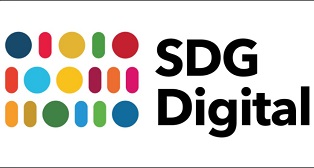More than two-thirds of the UN’s targets for sustainable development can benefit directly from digital technologies, according to the International Telecommunication Union (ITU) and the United Nations Development Programme (UNDP), organizers of SDG Digital which opened today at United Nations Headquarters in New York.
With digital technologies so closely linked to the Sustainable Development Goals (SDGs), the SDG Digital event highlights how safe, inclusive and scalable digital solutions can put the 2030 Agenda for Sustainable Development back on track amid concerns that the world may miss the vision for people, planet and prosperity that was set in 2015.
The SDG Digital Acceleration Agenda, a global analysis of the connections between digital technologies and sustainable development, was released as part of SDG Digital to provide a roadmap to governments on their digital transformation journey and to promote action and financing.
“With only a fraction of the SDGs on track at the halfway point of the 2030 Agenda, it is urgent to ensure that everyone, everywhere can build their own digital futures,” said ITU Secretary-General Doreen Bogdan-Martin and UNDP Administrator Achim Steiner in the foreword of SDG Digital Acceleration Agenda. “The recent breakthroughs in digital technology have unleashed unprecedented opportunities, and with them new avenues for digital innovation in our race against time to fulfil the promise of the 2030 Agenda.”
Uniting around digital to drive sustainable development
According to UN assessments, progress on half of the 169 SDG targets is either weak or insufficient at the 2030 Agenda’s halfway point. Thirty per cent of the SDG targets have either stalled or gone in reverse.
With digital transformation demanding joint efforts between the private sector, financial institutions, civil society, the UN, governments and young people, SDG Digital brings together experts, policy-makers and business leaders to explore the achievements, gaps and solutions on how digital technologies can support the 2030 Agenda.
Scale and innovation accelerate transformation
The SDG Digital Acceleration Agenda, developed by ITU and UNDP together with Boston Consulting Group (BCG) as knowledge partner, and the Inter-American Development Bank (IDB) as Agenda supporter, shows how digital technologies kickstart economic and societal transformation by creating scale and efficiencies.
The Agenda features digital solutions that are already demonstrating how tech can directly benefit 119 of the 169 SDG targets, or about 70 per cent, including in areas such as climate action, education, hunger and poverty.
“When you look at these game-changing digital solutions, you can see the actual building blocks that can drive us toward universal and meaningful connectivity,” said Bogdan-Martin. “This is how we can – and will – work together to ensure our shared digital future is inclusive, sustainable, and safe and responsible – and to do it in this decade.”
Data in the SDG Digital Acceleration Agenda suggest that countries which improved their digital maturity—as measured by digital affordability and infrastructure indices—outpaced their peers in SDG progress for selected income levels.
The Agenda also profiles the opportunities for sustainable development offered by advancements such as generative AI, 5G networks, and blockchain.
Financing and joint action bring scale and innovation
Digital transformation requires considerable investment in connectivity infrastructure, building up digital skills, and creating the conditions for job retraining and new opportunities.
SDG Digital highlights that the funding gap of over USD3.7 trillion for the SDGs should focus international efforts on enablers—such as infrastructure and connectivity—as well as the pooling of resources through collaboration including the private sector and the utilization of diverse financing methods.
Digital public infrastructure as a catalyst for the SDGs
The formal opening of SDG Digital is part of the UN’s SDG Action Weekend, a series of High Impact Initiatives focused on mobilizing further leadership and investment to bring progress to scale between now and 2030. This includes the UN High Impact Initiative on Digital Public Infrastructure to scale inclusive and open digital ecosystems for the SDGs.
Today’s decisions by countries on how to build their digital public infrastructure (DPI) will have lasting consequences on their opportunity to grow and innovate, and to achieve the SDGs by 2030.
As highlighted in a recent G20 publication supported by UNDP, DPI – built on robust governance and strong local digital ecosystems – can deliver value and high impact across all of the 17 SDGs to leave no one behind.
“Digital public infrastructure represents the ‘roads and bridges’ of our new era on which countries can ‘transport’ a range of vital services to citizens, from e-health and e-government services to online education and social protection,” said Achim Steiner. “As our global community’s shared plan for a better future in the Sustainable Development Goals faces challenges, bold investments in DPI by governments are a tried-and-tested means to get them back on track — an ambition that the UN is matching by empowering 100 countries with a range of now-vital DPI solutions to ensure that everyone, everywhere can build their own digital futures.”
Making connections means progress
Earlier in the week, ITU announced a decline in the number of people worldwide without a connection to the Internet to 2.6 billion people in 2023 from 2.7 billion in 2022.
The statistic on the global offline population is important for tracking connectivity, a foundation of using technology for sustainable development. At the current trend, the global targets for universal and meaningful connectivity are unlikely to be met by 2030.
The SDG Digital event and the SDG Digital Acceleration Agenda are the joint contributions of ITU and UNDP to the UN’s effort to bring stakeholders together at the SDG Action Weekend ahead of the SDG Summit and UN General Assembly High-Level Week.

